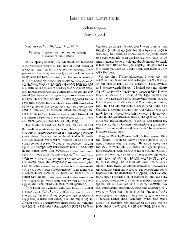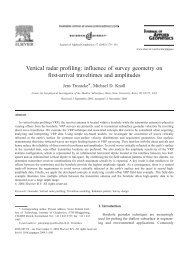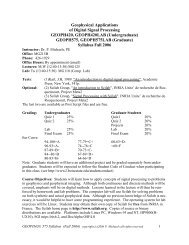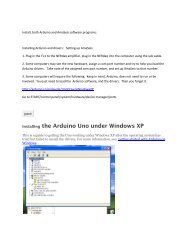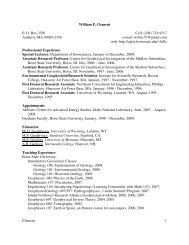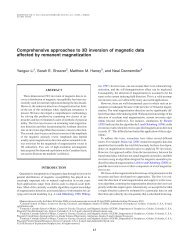Chapter 9 - Instructional Media: Chalkboards to Video - CGISS
Chapter 9 - Instructional Media: Chalkboards to Video - CGISS
Chapter 9 - Instructional Media: Chalkboards to Video - CGISS
You also want an ePaper? Increase the reach of your titles
YUMPU automatically turns print PDFs into web optimized ePapers that Google loves.
<strong>Chapter</strong> 5 – Managing Students & the Classroom<br />
Climate<br />
How you manage your students – and at times, yourself – can determine your success or<br />
failure in the classroom. This chapter helps you survive in the classroom – through<br />
behavioral suggestions, preparation guidelines, and common problems most instruc<strong>to</strong>rs<br />
have encountered.<br />
• Typical Problems<br />
• Some Survival Tips for the First Class Meeting<br />
• Guidelines for Building Positive Classroom Climates<br />
Typical<br />
Problems<br />
Here, we list a few typical problems that most instruc<strong>to</strong>rs have<br />
experienced at some point in their teaching.<br />
Class Attendance<br />
What do you do if students do not attend class<br />
Contrary <strong>to</strong> any rumors you may hear, official University policy is:<br />
Students are expected <strong>to</strong> attend all of their scheduled<br />
University classes, and other University activities such as<br />
examinations, study halls, and tu<strong>to</strong>rials, as determined by<br />
their departments and University faculty and staff. The<br />
University reserves the right <strong>to</strong> deal at any time with<br />
individual cases of nonattendance. The effect of absences<br />
upon grades is determined by the instruc<strong>to</strong>r. Arranging <strong>to</strong><br />
make up work missed because of legitimate class absence is<br />
the responsibility of the student. (General Bulletin)<br />
Depending upon the type of section, many instruc<strong>to</strong>rs leave the<br />
question of attendance up <strong>to</strong> individual students. At the beginning<br />
of the semester, it is a good idea <strong>to</strong> inform students, in writing, of<br />
your attendance policy.<br />
Related <strong>Chapter</strong> – See <strong>Chapter</strong> 3 – Creating a Syllabus,<br />
which gives examples for writing policy and rule statements.<br />
If you require attendance, be certain <strong>to</strong> have a system for<br />
recording it and a policy <strong>to</strong> follow for those who are absent.<br />
If you do not require attendance, it is still important <strong>to</strong> keep good<br />
attendance records. If a student comes <strong>to</strong> you because she is not<br />
passing your class, it is helpful <strong>to</strong> know the student’s attendance<br />
record. Any guilty feelings you may have when a student fails can<br />
Section: Course Planning – Management 46 <strong>Chapter</strong> 5: Managing Students



